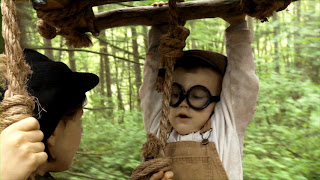Writer: Joel and Lisa Steege
Director: Joel Steege
Composer: Dane Walker
Year: 2010
The Runner from Ravenshead is an adventurous family produced film about how giving it to Him is better than giving up. It is an allegorical story in which kids represent grown-ups (in some cases) and in which a prison represents the bondages we find ourselves in when we don’t cast them on the Savior. Wardens steadily and relentlessly pursue the fleeing victims, who only wear out and wind up back in prison. We follow the progress of a girl named Sam as she tries to make her escape. The subject matter of this film is one I can’t say I’ve seen dealt with much, let alone in a film.
 The cast was apparently no more than 5 children, although there are more characters. Don’t expect the same actor/actress to be the same character. Sometimes there are even more than 5 people in the frame, so I’m thinking there must have been a good deal of green screen and frame blending going on.
The cast was apparently no more than 5 children, although there are more characters. Don’t expect the same actor/actress to be the same character. Sometimes there are even more than 5 people in the frame, so I’m thinking there must have been a good deal of green screen and frame blending going on.I’m a believer that kids can be the best talent, if directed well. Something about the imaginations they have. I think they are able to become the character easier. By the fact that these children (and any children) lack the experience and training of an adult professional, means they need to get the inspiration for the role from something else.
 There are numerous humorous (like my rhyme?) moments in the film. Funny stunts, comic expressions, and children's antics; it will at the very least get an occasional chuckle out of you. Or if you're like my sister, you'll laugh the whole thing through!
There are numerous humorous (like my rhyme?) moments in the film. Funny stunts, comic expressions, and children's antics; it will at the very least get an occasional chuckle out of you. Or if you're like my sister, you'll laugh the whole thing through!The score hardly gives one a moment’s reprieve. It’s says action, suspense, and grandeur in the first five minutes and doesn’t let off. The music was recorded live with an orchestra, which is not easy to do on a tight budget, believe me. There must have been some committed and talented folks behind that one.
 I liked the costumes! I thought they were fun and thoughtfully put together! Kind of like the days of dress-up we did as kids. But they were still natural (cept maybe the facial hair O.o).
I liked the costumes! I thought they were fun and thoughtfully put together! Kind of like the days of dress-up we did as kids. But they were still natural (cept maybe the facial hair O.o).Well done Steege family!
(I could critique various things in this film, but anyone can do that).







